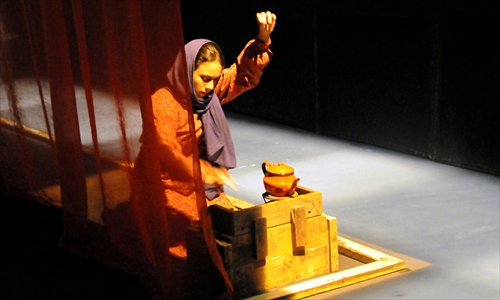

A scene from Kabul Photo: Courtesy of the Edinburgh Fringe Showcase 2014
Stage play 'Kabul' touches on the realities of Afghanistan under the Taliban
A bucket, basin, kettle, cup, bowl, lantern and several pieces of cloth, with these simple props the Brazilian Amok Theatre manages to present an extraordinary performance full of power and tension in their stage play Kabul - a work that digs into the impact of war and reflects on the pain caused during a dark time in Afghanistan.
Featured at the Beijing Donggong Theatre from Tuesday to Thursday, the Brazilian play was brought to China to open the Edinburgh Fringe Showcase (EFS) 2014, which runs until December. Telling a story of two couples living in Kabul, Afghanistan in 1999, it shows how four ordinary people manage to adhere to the pure side of human nature and maintain dignity under the Taliban regime.
"Every country has its own sufferings, but some of them are similar. What the play talks about is universal," noted Crystal D, curator of EFS.
Choice in despair
"Women are prohibited from walking on the street alone or talking to strangers. They must wear long robes that wrap their entire body and face. Otherwise, they will be brutally published," a cold voice at the start of the play reads the laws of the Taliban after it took Kabul in 1996.
The ruthless monologue immediately transports the audience into the stifling atmosphere of that time and the sad story of two families.
One of the husbands is a jailor who has to face the suffering of prisoners every day and meanwhile dealing with his own pain. He has a wife he is not very fond of who is dying from an incurable disease. In intolerable pain, she struggles every day to fulfill her duty as a wife to shoulder household chores and take care of her husband.
In the other family, the husband has been rushing around trying to find a job but to no avail. He falls into boundless despair when he can't even find a job others would be ashamed to take, and he and his wife end up on the verge of starvation. The only light in his life is his wife, who is bright and optimistic, and he sees her as his last hope in life.
Though hopeless, their lives are peaceful until a woman is stoned to death. Both husbands witness the pitiful sight where, as the jailer describes to his wife, onlookers become thugs thirsty for blood and thrown stones at the woman who falls still after several minutes.
The play reaches one climax when the unemployed husband reveals to his wife that he was one of the men that killed the woman. "I don't know why there were stones in my hand. … It was like I was cursed by those people," he explains.
This revelation shocks his wife, who knows him as a gentle and elegant man. The two argue and the husband falls to his death by accident. As the woman is condemned to death for killing her husband, the audience finds out she is the younger sister of the other wife.
Unable to seek justice, the disease-ridden woman finally decides to die for her sister, covered in clothing from head to toe, she switch places with her sister.
The play ends with a heartbreaking scene: Two sisters huddled in two different corners, one in jail quivering with pain and afraid of dying and the other waiting in the jailer's room shivering in fear about an unclear future.
A snapshot in time
This suffocating story taking place during a dark period of Afghanistan's history, Kabul is the second part of director Ana Teixeira's "Trilogy of War," alongside The Dragon and Family History, an artistic trajectory that reflects on harsh realities.
Diverse acts to play New Zealand Music Fest
2014-09-12Fading of memories enriches new play
2014-08-27Shakespeare‘s ‘Dream‘ to play in Shanghai
2014-08-15Copyright ©1999-2018
Chinanews.com. All rights reserved.
Reproduction in whole or in part without permission is prohibited.